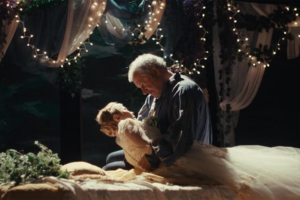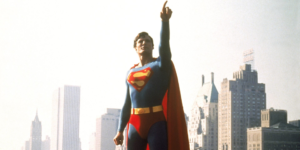Reviewed by GREG KING
Director: Ben Elton
Stars: Robert Sheehan, Rebecca Breeds, John Waters, Michael Caton, Magda Szubanski, Deborah Mailman, Jacqueline McKenzie, Kelton Pell, Kate Box, Amay Jain, Peter Rosethorn, Christian Van Vuren, Nick Boshier, Caroline Brazier.
This amiable crowd-pleasing comedy is set against the backdrop of the fictitious annual Westival Folk Music Festival in Western Australia. Every year people gather to enjoy the music and the atmosphere. Amongst the regular visitors are the WArrikins, an Irish folk music band fronted by fiddle player Keevey (Rebecca Breeds) and her hard-drinking father Eamon (John Waters), a quartet of empty nesters who drive up in their kombi vans and drink wine, and Roland (Robert Sheehan, recently seen in Geostorm, etc), a pretentious Theremin player who is passionate about music. Roland and Keevey initially clash over the issue of digital technology and music, but their prickly relationship soon develops into more and becomes one of the central plot points of the film.
We also meet the recently widowed Henry (Michael Caton) the leader of a troupe of Morris dancers who butts heads with aboriginal elder Jack (Kelton Pell), the leader of a troupe of indigenous dancers. Henry is forced to confront his own racism and prejudices. And there is Jafaar (Amay Jain), an Afghan refugee who is still trying to come to terms with both his adopted family and country. There is also an overly officious, power tripping security guard (played by Kate Box, who virtually steals every scene she appears in).
The drama and romances here play out over the course of three Westival festivals, hence the title. Three Summers is the second feature film directed by writer/director Ben Elton, who is best known for his work on television comedies like The Young Ones and Black Adder, etc. This is his first feature since 2000’s Maybe Baby. His script mixes comedy with some strong political observations as he explores contemporary themes and issues such as Australia’s past, racism, the stolen generation, indigenous land rights, the refugee issue. Elton aims to prick our conscience as he holds up a mirror to our darker human nature.
The film covers three years, but the structure gives it an episodic feel as Elton weaves a number of narrative threads and character arcs through the material. Elton has used the setting of the music festival as a device through which to offer up a critique of contemporary Australia, but it is nowhere near as abrasive as Kriv Stenders’ recent drama Australia Day.
Three Summers has plenty of irreverent and larrikin humour, but there are some moments that fall flat and don’t work as effectively as Elton would have liked. The humour is not quite as subversive as Elton would have hoped, and his observations hit home with a lack of subtlety. There are some clever running jokes throughout the material, including a gag about the Theremin being the instrument that Brian Wilson played on the classic Good Vibrations, and a folk singer who serves up her politically charged renditions of classic Australian anthems.
Elton has assembled a great cast to flesh out the characters, but as with most ensemble pieces some characters are more fleshed out and more fully developed. Some of the characters here are either one dimensional or lazy stereotypes. Breeds is charming and brings intelligence to her performance as the feisty and talented Keevey, and there is some real and prickly chemistry between her and Sheehan. Caton also delivers another solid performance as Henry, who is forced to confront his own prejudices.
Deborah Mailman is largely wasted in a small role as an alcohol counsellor. Peter Rosethorn plays one of the empty nesters, but we don’t get much insight into his character. Jacqueline McKenzie also is given little to do as a humourless music professor. Magda Szubanski is great as Queenie, the local community radio station announcer who provides a link between the various characters and subplots over the course of the three summers.
There is a great soundtrack that features the likes of Xavier Rudd, Gotye, the John Butler Trio that adds to the upbeat mood. The film also looks great thanks to the superb widescreen lensing of Katie Milwright (Looking For Grace, etc).
★★★




